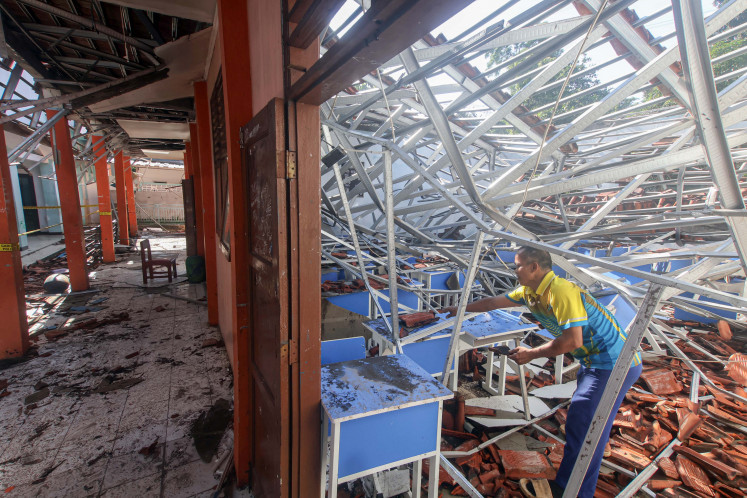Popular Reads
Top Results
Can't find what you're looking for?
View all search resultsPopular Reads
Top Results
Can't find what you're looking for?
View all search results`Becak' drivers challenge authorities over right to work
Writer Christopher J
Change text size
Gift Premium Articles
to Anyone
W
riter Christopher J. Koch, in his book about 1965 Jakarta on the brink of political tumult, The Year of Living Dangerously, depicted the three-wheeled pedicabs, or becak, as one of the city's icons.
The story's protagonist was depicted in the book once pedaling the tricycle-rickshaw around the Hotel Indonesia traffic circle to the hotel on Jl. Thamrin.
Today, it would be unimaginable to see becak circling the city's landmark. The city administration banned the iconic vehicle from the streets of Jakarta in the 1970s, deeming them a menace to public order.
A continuous systematic attempt to eliminate the environmentally friendly vehicle has been carried out since the late 1990s, when then Jakarta governor Sutiyoso, in a move that only he could have conceived of, dumped hundreds of becak into the Jakarta bay. In 2007, the Jakarta administration reinforced the ban under a bylaw on public order.
Despite years of being banned, thousands of becak still operate in kampungs in West, East and mostly North Jakarta, says Marno Nandang Triwanto, from the Urban Poor Consortium (UPC). The becak drivers operate under fear of getting caught by public order officers, who confiscate any pedicabs they find.
These drivers are currently organizing a movement to protest the ban. Arguing it is unconstitutional, as it deprives them of their right to a livelihood, becak drivers staged a protest recently demanding the ban be lifted. Seventy-five drivers from North Jakarta pedaled their pedicabs to the North Jakarta municipal office, demanding the right to work.
From his becak in Koja, North Jakarta, Yusuf, 29, says he joined the Jakarta Becak Association (Sebeja) to defend his rights as a Jakartan.
"We need the money to live. I don't mind not driving a becak, as long as the administration can give us jobs," he says.
He adds he is enraged at the becak ban and at allegations of corruption among public order officers.
Yusuf says some officers run a business of confiscating becak.
"In the 90s, confiscated becak were thrown to the sea, but now some public order officers extort bribes from the drivers," he says.
Becak driver Dion, 27, says an officer once demanded Rp 200,000 (US$19) from him to get his confiscated becak back.
"I didn't have that kind of money, so I didn't get it back," he says, adding he now rents a becak for Rp 5,000 a day.
The drivers say the officers dismantle the pedicabs and sell the parts as scrap metal.
The Jakarta Post's calls to Jakarta Public Order Agency head Harianto Bajoeri went unanswered.
Yusuf says a becak can cost from Rp 500,000 to Rp 1 million. He says becak drivers or owners buy them from a manufacturer in Bekasi and pedal them over to North Jakarta.
Jakarta has no becak manufacturers. The 2007 bylaw prohibits becak assembling, ownership and operation. Operating and owning a becak is punishable with a month in jail or fines of up to Rp 5 million. Manufacturing or bringing a becak to Jakarta is punishable with three months in jail or fines of up to Rp 30 million.
Civil society groups say the bylaw discriminates against the poor.
"Becak drivers don't violate the Constitution; the public order bylaw does, by depriving the drivers of their rights," the UPC's Marno says.
He adds he hopes the movement grows to push for change.
"We hope to bring together all becak drivers from around Jakarta."
Becak driver Syarifudin, 38, says he may join the movement.
"Working like this, we feel like burglars or criminals," he says.
"Maybe because becak don't contribute money to the government, compared to motor vehicles that are taxed each year."
Institute of Transportation Studies (Instran) chairman Darmaningtyas says non-motorized vehicles should serve as a feeder for people coming off buses at the bus stop to their destination.
He says becak or bicycles, which travel no faster than 3 kilometers per hour, are the appropriate options.
"But when becak were prohibited, ojek *motorcycle taxis* took their place," he says.
"Jakarta still needs becak; not on main thoroughfares, but on smaller streets connecting one kampung to another. This way, housewives going to the market can take becak.
"But since they're no longer available, people have to take things like bajaj *three-wheeled taxi*, which are more polluting."
Darmaningtyas adds the pretext for the becak ban, that they caused traffic jams, was unfounded.
"With no becak around, we still have traffic jams," he says.
Yusuf says he joined the movement because he was fed up with how officers treated becak drivers.
"As a young person, I should work to change our fate," he says.
Not all becak drivers are as optimistic. Syuaib, 45, says he heard about the protest against the ban, but refuses to join in.
"I'm sick of this situation. Nothing will change, it's useless. The little people always lose," he says.










